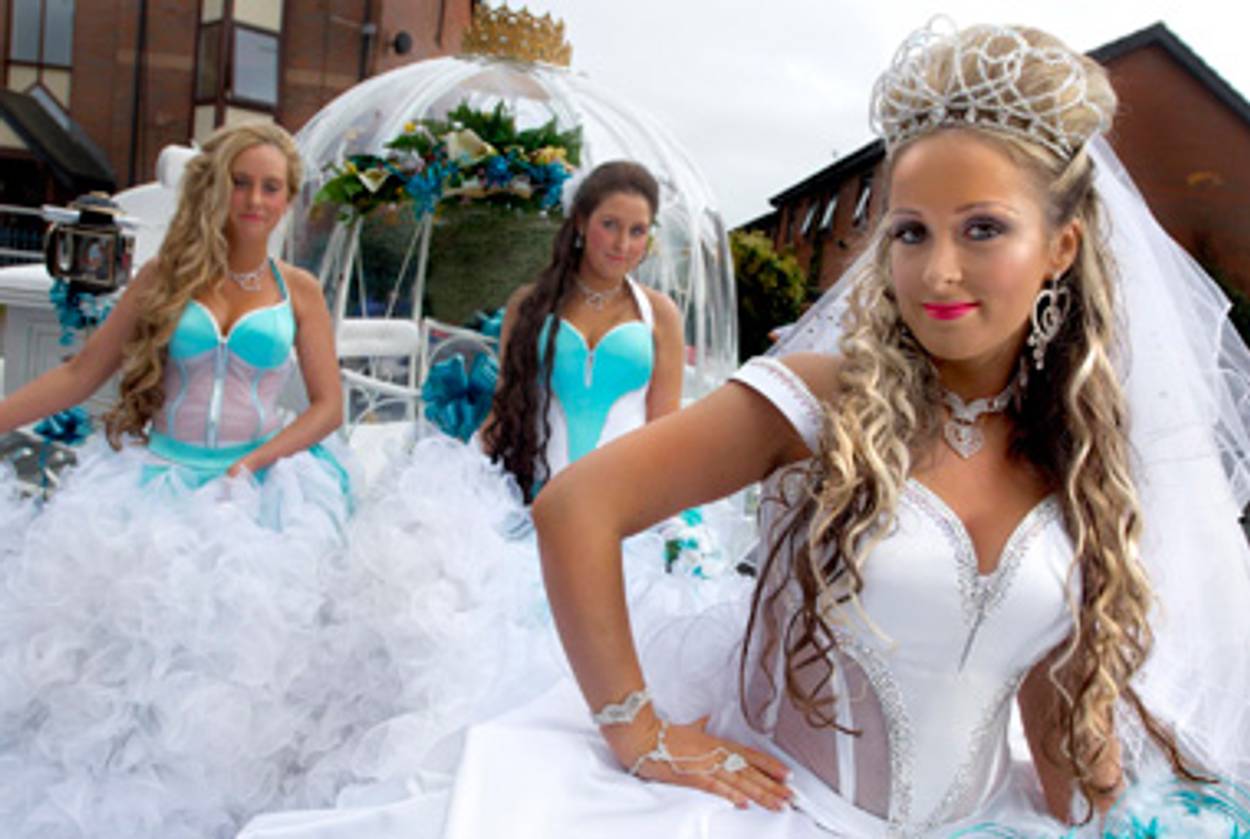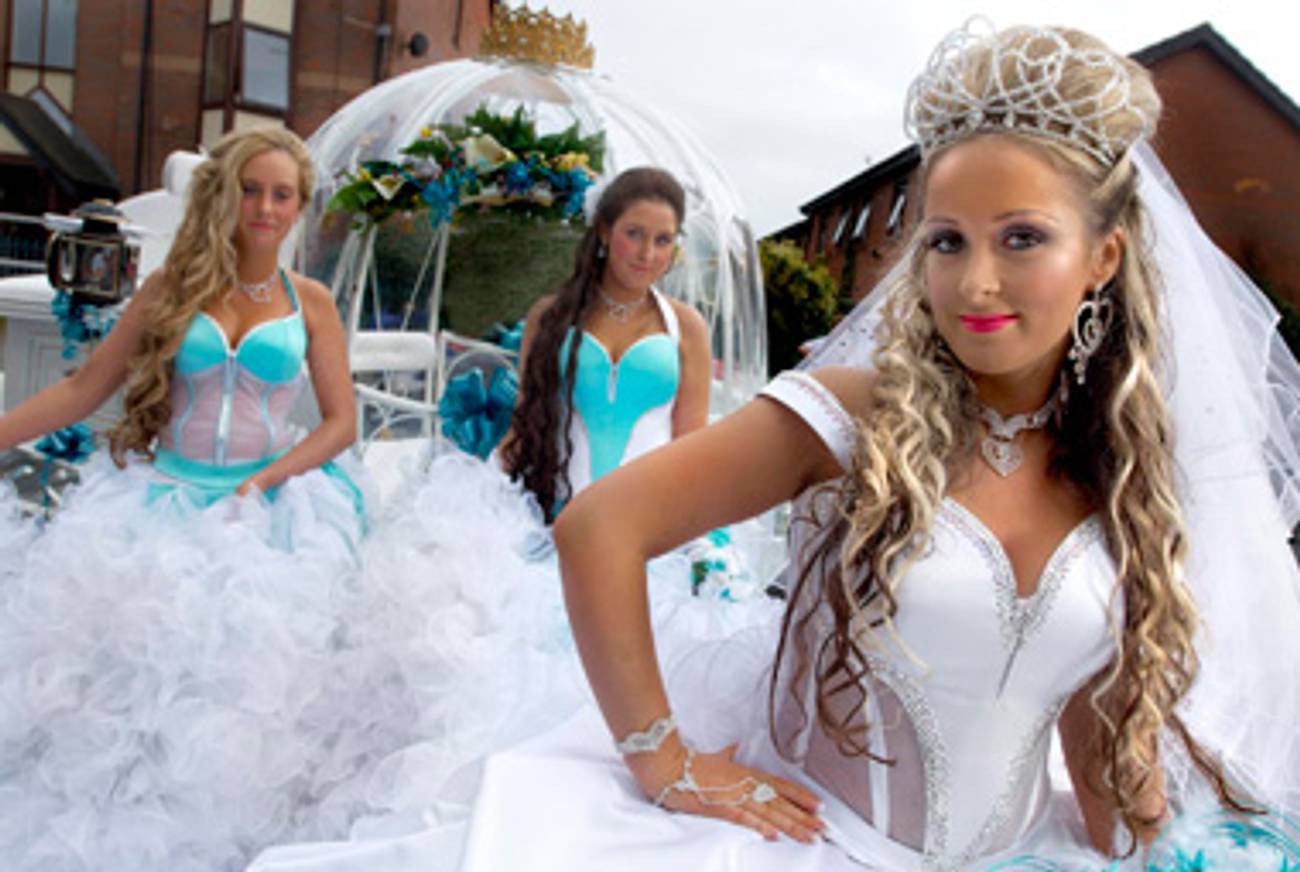Polyester Brides
Big Fat Gypsy Weddings—a documentary miniseries from the U.K. about a peripatetic group known as the Irish Travellers—has much to say about marginalized minorities everywhere




An insular, strictly endogamous ethnic community shrouded at least partially in secrecy, with their own peculiar rituals, proscriptions, language, ethical standards, and modes of dress, which inspires both curiosity and (occasionally) hostility from society at large? Sounds familiar, no?
But in the documentary seriesBig Fat Gypsy Weddings—a mega-hit in Britain set to hit American television screens later this month—the group in question is not the one that regular readers of Tablet might immediately think of when they hear the words “insular” and “endogamous.” Yet certain aspects may feel eerily familiar just the same.
For hundreds of years, the Gypsies of the show’s title, the Irish Travellers—who speak their own language of Shelta, a English dialect with heavy Irish/Gaelic influences—have led a marginalized existence throughout the British Isles. Due to their similarly peripatetic lifestyles, the Travellers are often confused with the Roma, the ethnic group whose deep musical tradition so influenced klezmer, and who are often (but not often enough) mentioned alongside Jews as victims of the Holocaust, but they are separate groups with disparate traditions and origins (although they do begin to crop up in later episodes of the show; for better or for worse, the two communities have similar lifestyles and, therefore, a great deal of overlap in the public imagination).
The documentary purports to shed light for the first time on this notoriously secretive community clustered in portable trailer parks and roadside camps throughout England and Ireland. The Travellers are most likely the descendants of Irish peasants left homeless by Cromwell’s military campaigns and are indigenous to the British Isles, a fact that makes it all the more poignant when Elizabeth, a young Traveller girl profiled in the documentary, speaks of the hostility her community still encounters from “settled” people. They are also called “gorgers,” a term that seems to intimate the same blend of amusement and disdain as another word I know that starts with a “G”): “They call us gyppos, gypsy scum, say ‘go back to where you came from.’ ” Where, precisely, are they supposed to go?
As the title would suggest, the five-part series centers on the extravaganza of the Traveller wedding, in all its bedazzled, faintly medieval glory, although its reach is much further than that. The wedding, one of the more conspicuous traditions of the Traveller community, is our way in, so to speak. Our guide and Greek chorus—apart from an omniscient female narrator whose clipped BBC accent carries a faintly elegiac tinge—is Thelma Madine, a Liverpool dressmaker (and non-Traveller) who specializes in the creation of the tulle behemoths favored by Traveller brides, adorned with countless rhinestones, yards of lace, and, in one case, electric lights and mechanical butterflies. As such, Thelma occupies a unique outsider/insider perspective on a society that in her words, “doesn’t want anyone to know anything about them.” Traveller girls typically leave school in their early teens and are married soon thereafter—16- and 17-year-old brides are the norm. The dressmaker Thelma (as she is constantly referred to in the voiceover) is often brought, as prototypes, pictures of Disney princess from Cinderella to Princess Tiana from The Princess and the Frog, as perhaps befitting their age, or in one spectacular incidence, a request for a gown based on the monstrous pink one from the wedding scene in the 1988 Eddie Murphy movie, Coming to America, which is exactly what I would have chosen for my wedding when I was 6 years old, if not 16.
What they wear the rest of the time is another matter. Bare midriffs, bras for shirts, visible thong underwear abound. Thelma observes, “To see them most of the time, you would think they were prostitutes.” But you can’t judge a book by its cover, and you can’t judge a Traveller girl by her cleavage. “They really are the most moral people you ever could meet,” Thelma says. Travelers practice the kind of strict sex segregation rarely seen outside of Saudi Arabia or Satmar Williamsburg. Girls travel in packs; they’re not allowed to date or be briefly alone with a boy. Even after a girl is engaged she must bring a chaperone, usually her mother, on all outings with her intended. While Traveller boys have, if not much education, a relatively free hand in the world, girls are expected to stay at home, clean, cook, and look after younger brothers and sisters—sort of a mandated apprenticeship for their married lives. Drinking is strictly forbidden for girls, as is the use of foul language—16-year-old bride-to-be Josie declares that she’d “rather die than swear in front of a man”—and do I have to tell you how they feel about the importance of virginity? (Let’s just say “strongly.”)
While the attitude of the filmmakers toward the treatment of Traveller women is plagued with more than a hint of patronizing cultural relativism, the show doesn’t shy away from showing the dark side of the society. As in all communities where women are treated as second-classes citizens, domestic violence is rife. (After all, the dehumanization of the Other begins at home.) The difficulties facing a Traveller woman in an abusive situation are compounded by the threat of ostracism from the community if she leaves and her lack of education; the vast majority of Traveller adults (and particularly women) are functionally illiterate. “I mean, I’m not terrible,” says 18-year-old bride Lizzie, in the same tone one might describe one’s limited ability at speaking French or downhill skiing. “But we ain’t going to be doctors, or lawyers, or anything. Housewives, that’s what we’re meant to be.”
And now for the moment you’ve all been waiting for: What does this have to do with the Jews? The blessedly liberating answer, on the surface at least, is that it doesn’t. Despite my tongue-in-cheek opening paragraph, and despite the various superficial similarities (the ambivalence about assimilation! The traditional role of women! The traumatized expression on the face of the mother of the boy who has insisted on marrying a non-Gypsy!), the two groups aren’t really comparable (for example, more alcohol consumed in a single 45-minute Traveller cemetery visit than has been in Crown Heights in the past 15 years—except, obviously, on Purim).
Many Jews, myself included, have been so conditioned to see everything through the (often paranoid) lens of our own experience, which is how you wind up driving yourself crazy thinking that Toy Story 3 is a Holocaust allegory and the goblins in the Harry Potter franchise are meant as some Streicher-esque depiction of Jews (they work in banks and have their own language too). But watching Big Fat Gypsy Weddings, I found myself in the welcome position of viewing a minority group from the position of the comfortable majority, capable of gawping at a maligned subculture without immediately wondering “what it all meant” (the key to the series’ success, no doubt, is the way the filmmakers have managed to mix outright prurience with earnest concern; they’ve figured out a way for us to have our 8-foot-tall Sleeping Beauty’s Castle wedding cake and eat it too). I felt like one of them (gorgers or goyim, take your pick) watching us, and what I discovered on the other side was surprising: that curiosity is not the same thing as hostility; that incomprehension or even disapproval does not preclude empathy; and, perhaps most clearly, the disturbing symbiosis that often occurs between persecutor and persecuted.
A few examples from the series best illuminate this last phenomenon. One is the instance of John, a Romany Gypsy (one of the few featured in the series) on his way to the Appleby Horse Fair in Yorkshire, an annual meeting place, or “Mecca” as he calls it, for the Gypsy and Traveller communities. On his way, John takes offense to road signs reading “No Stopping,” as well as a notice at a roadside inn advising that its parking lot is reserved solely for its guests. I was perplexed by his anger; I figured the transportation authority just didn’t want people parking on the shoulder of the interstate and the inn management just wanted to save priority for paying customers, but according to John, the sign might as well as read, “‘No Gypsies.’” Wounded, he confronted the bemused parking attendant, and I suddenly remembered the looks of annoyed bafflement on the face of every teacher, Girl Scout leader, and friend’s mother I was compelled to tell that I couldn’t take the test scheduled for Yom Kippur, make the Christmas ornaments, or eat the pepperoni pizza they’d ordered. They didn’t get it, and I had offended them by reflexively taking offense.
Later on, we get to see just how quickly bemusement can turn ugly. In the fifth and final installment of the series, Thelma Madine has been commissioned to create outfits for the bridal party of a Traveller wedding in Northern Ireland. The bride’s mother has been vague and even misleading about the date of the wedding (common enough among Travellers, who fear that churches and hotels will simply cancel bookings if given enough time to discover who they are hosting), but Thelma, who for the most part is hugely sympathetic to their plight, finally suspects she’s being taken for a ride. “I’m not a die-hard Traveller supporter, I’m not saying that. But I have stuck up for them, and this makes me so angry.” In about 30 seconds, the otherwise impeccably well-meaning Thelma has managed to conflate the exasperating behavior of one woman with that of an entire group.
Collective blame—it’s something we Jews know all too well, and we have all too often found ourselves on both sides of it. It is the very essence of prejudice, on which we certainly have no monopoly. Bigotry, persecution, tragedy: This may be the history of the Jewish people, but it’s also the history of the whole world.
Rachel Shukert, a Tablet Magazine columnist on pop culture, is the author of the memoirs Have You No Shame? and Everything Is Going To Be Great. Starstruck, the first in a series of three novels, is new from Random House. Her Twitter feed is @rachelshukert.
Rachel Shukert is the author of the memoirs Have You No Shame? and Everything Is Going To Be Great,and the novel Starstruck. She is the creator of the Netflix show The Baby-Sitters Club, and a writer on such series as GLOW and Supergirl. Her Twitter feed is @rachelshukert.